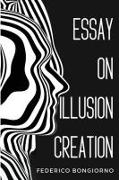Essay on illusion creation
BücherAngebote / Angebote:
This thesis is set out as a collection of self-standing essays. Throughout these essays, I try to illuminate a number of controversies surrounding the way in which delusions are formed, and relatedly, their nature and epistemic standing. In Chapter 2, after an introductory chapter, I flesh out a new 'endorsement' approach to the Capgras delusion, the main idea being that the delusion is formed by endorsing the content of a metaphorical-perceptual state in which a loved one is represented metaphorically as an imposter. In Chapter 3, I take issue with the idea, prevalent in the literature, that Bayesian accounts of inference in delusions are best characterised as versions of 'explanationism' (the view that delusions arise via an inferential process grounded in experience). Taking one such influential account as a test case, I argue that it is no more or less compatible with the endorsement alternative, which says delusions are acquired non-inferentially from experience. In Chapter 4, I examine a recent critique of predictive processing theories of delusions, according to which such theories suffer two limitations: they fail to explain why an agent believes something delusional as opposed to nothing at all or something else, they fail to explain how delusional hypotheses are generated in the first place. I suggest ways in which these concerns might be addressed. In Chapter 5, I consider how the Spinozan theory of belief fixation (the view that sees such processing as strictly unconscious and reflexive) can improve the prospects of doxasticism about delusions (the view that they are beliefs). Doxasticism has been criticised on the grounds that delusions typically do not abide by rational standards which we expect beliefs to conform to. If belief fixation is Spinozan, I argue, these deviations from rationality are not just compatible with, but supportive of, their status as beliefs. In Chapter 6, I ask whether misidentification delusions formed via endorsement processes (MDs) have any measure of perceptual justification. To give the best chance of getting a 'yes' answer, I address the question from the perspective of perceptual dogmatism, as this appears the best option if we are to grant at least defeasible justifiedness to MDs. I argue that, even so, MDs are completely unjustified.
Folgt in ca. 15 Arbeitstagen
